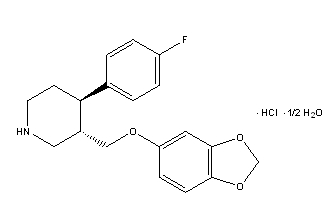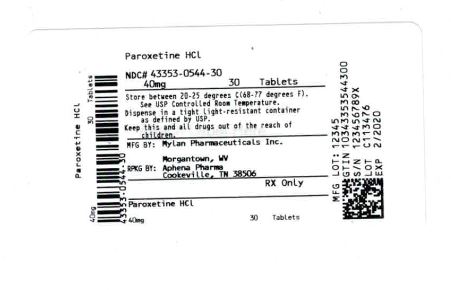Breast milk is superior in nutrition, It provides resistance against infections and allergies, It is naturally sterile. Despite all the advantages of breastfeeding some mothers choose to pause the breastfeeding in fear of harmful effects of medicines passing in breast milk. Are you wondering about breastfeeding and using Paroxetine Hydrochloride Hemihydrate Tablet ? Know what is Paroxetine Hydrochloride Hemihydrate Tablet and how it can affect your breast milk and whether Paroxetine Hydrochloride Hemihydrate Tablet is safe for your kid or not.
What is Paroxetine Hydrochloride Hemihydrate Tablet used for?
Major Depressive Disorder Paroxetine tablets are indicated for the treatment of major depressive disorder. The efficacy of paroxetine tablets in the treatment of a major depressive episode was established in 6-week controlled trials of outpatients whose diagnoses corresponded most closely to the DSM-III category of major depressive disorder (see CLINICAL PHARMACOLOGY: Clinical Trials). A major depressive episode implies a prominent and relatively persistent depressed or dysphoric mood that usually interferes with daily functioning (nearly every day for at least 2 weeks); it should include at least four of the following eight symptoms: Change in appetite, change in sleep, psychomotor agitation or retardation, loss of interest in usual activities or decrease in sexual drive, increased fatigue, feelings of guilt or worthlessness, slowed thinking or impaired concentration, and a suicide attempt or suicidal ideation. The effects of paroxetine tablets in hospitalized depressed patients have not been adequately studied. The efficacy of paroxetine tablets in maintaining a response in major depressive disorder for up to one year was demonstrated in a placebo-controlled trial (see CLINICAL PHARMACOLOGY: Clinical Trials). Nevertheless, the physician who elects to use paroxetine tablets for extended periods should periodically reevaluate the long-term usefulness of the drug for the individual patient. Obsessive Compulsive Disorder Paroxetine tablets are indicated for the treatment of obsessions and compulsions in patients with obsessive compulsive disorder (OCD) as defined in the DSM-IV. The obsessions or compulsions cause marked distress, are time consuming, or significantly interfere with social or occupational functioning. The efficacy of paroxetine tablets was established in two 12-week trials with obsessive compulsive outpatients whose diagnoses corresponded most closely to the DSM-IIIR category of obsessive compulsive disorder (see CLINICAL PHARMACOLOGY: Clinical Trials). Obsessive compulsive disorder is characterized by recurrent and persistent ideas, thoughts, impulses, or images (obsessions) that are ego-dystonic and/or repetitive, purposeful, and intentional behaviors (compulsions) that are recognized by the person as excessive or unreasonable. Long-term maintenance of efficacy was demonstrated in a 6-month relapse prevention trial. In this trial, patients assigned to paroxetine showed a lower relapse rate compared to patients on placebo (see CLINICAL PHARMACOLOGY: Clinical Trials). Nevertheless, the physician who elects to use paroxetine tablets for extended periods should periodically reevaluate the long-term usefulness of the drug for the individual patient (see DOSAGE AND ADMINISTRATION). Panic Disorder Paroxetine tablets are indicated for the treatment of panic disorder, with or without agoraphobia, as defined in DSM-IV. Panic disorder is characterized by the occurrence of unexpected panic attacks and associated concern about having additional attacks, worry about the implications or consequences of the attacks, and/or a significant change in behavior related to the attacks. The efficacy of paroxetine tablets was established in three 10- to 12-week trials in panic disorder patients whose diagnoses corresponded to the DSM-IIIR category of panic disorder (see CLINICAL PHARMACOLOGY: Clinical Trials). Panic disorder (DSM-IV) is characterized by recurrent unexpected panic attacks, i.e., a discrete period of intense fear or discomfort in which 4 (or more) of the following symptoms develop abruptly and reach a peak within 10 minutes: (1) palpitations, pounding heart, or accelerated heart rate; (2) sweating; (3) trembling or shaking; (4) sensations of shortness of breath or smothering; (5) feeling of choking; (6) chest pain or discomfort; (7) nausea or abdominal distress; (8) feeling dizzy, unsteady, lightheaded, or faint; (9) derealization (feelings of unreality) or depersonalization (being detached from oneself); (10) fear of losing control; (11) fear of dying; (12) paresthesias (numbness or tingling sensations); (13) chills or hot flushes. Long-term maintenance of efficacy was demonstrated in a 3-month relapse prevention trial. In this trial, patients with panic disorder assigned to paroxetine demonstrated a lower relapse rate compared to patients on placebo (see CLINICAL PHARMACOLOGY: Clinical Trials). Nevertheless, the physician who prescribes paroxetine tablets for extended periods should periodically reevaluate the long-term usefulness of the drug for the individual patient (see DOSAGE AND ADMINISTRATION). Social Anxiety Disorder Paroxetine tablets are indicated for the treatment of social anxiety disorder, also known as social phobia, as defined in DSM-IV (300.23). Social anxiety disorder is characterized by a marked and persistent fear of one or more social or performance situations in which the person is exposed to unfamiliar people or to possible scrutiny by others. Exposure to the feared situation almost invariably provokes anxiety, which may approach the intensity of a panic attack. The feared situations are avoided or endured with intense anxiety or distress. The avoidance, anxious anticipation, or distress in the feared situation(s) interferes significantly with the person's normal routine, occupational or academic functioning, or social activities or relationships, or there is marked distress about having the phobias. Lesser degrees of performance anxiety or shyness generally do not require psychopharmacological treatment. The efficacy of paroxetine tablets was established in three 12-week trials in adult patients with social anxiety disorder (DSM-IV). Paroxetine tablets have not been studied in children or adolescents with social phobia (see CLINICAL PHARMACOLOGY: Clinical Trials). The effectiveness of paroxetine tablets in long-term treatment of social anxiety disorder, i.e., for more than 12 weeks, has not been systematically evaluated in adequate and well controlled trials. Therefore, the physician who elects to prescribe paroxetine tablets for extended periods should periodically reevaluate the long-term usefulness of the drug for the individual patient (see DOSAGE AND ADMINISTRATION). Generalized Anxiety Disorder Paroxetine tablets are indicated for the treatment of Generalized Anxiety Disorder (GAD), as defined in DSM-IV. Anxiety or tension associated with the stress of everyday life usually does not require treatment with an anxiolytic. The efficacy of paroxetine tablets in the treatment of GAD was established in two 8-week placebo-controlled trials in adults with GAD. Paroxetine tablets have not been studied in children or adolescents with Generalized Anxiety Disorder (see CLINICAL PHARMACOLOGY: Clinical Trials). Generalized Anxiety Disorder (DSM-IV) is characterized by excessive anxiety and worry (apprehensive expectation) that is persistent for at least 6 months and which the person finds difficult to control. It must be associated with at least three of the following six symptoms: Restlessness or feeling keyed up or on edge, being easily fatigued, difficulty concentrating or mind going blank, irritability, muscle tension, sleep disturbance. The efficacy of paroxetine tablets in maintaining a response in patients with Generalized Anxiety Disorder, who responded during an 8-week acute treatment phase while taking paroxetine tablets and were then observed for relapse during a period of up to 24 weeks, was demonstrated in a placebo-controlled trial (see CLINICAL PHARMACOLOGY: Clinical Trials). Nevertheless, the physician who elects to use paroxetine tablets for extended periods should periodically reevaluate the long-term usefulness of the drug for the individual patient (see DOSAGE AND ADMINISTRATION).
I am currently breastfeeding and I want to know if using Paroxetine Hydrochloride Hemihydrate Tablet is safe for my kid? Does it have any effect on milk production?
Active ingredient in Paroxetine Hydrochloride Hemihydrate Tablet is Paroxetine and based on our analysis of Paroxetine it appears that using Paroxetine Hydrochloride Hemihydrate Tablet is safe in breastfeeding. Below is analysis of Paroxetine while breastfeeding.
Statement of Manufacturer/Labeler about breastfeeding usage
Nursing Mothers Like many other drugs, paroxetine is secreted in human milk, and caution should be exercised when paroxetine hydrochloride is administered to a nursing woman.
Paroxetine Hydrochloride Hemihydrate Tablet Breastfeeding Analsys
SafeCAS Number: 61869-08-7
Excreted in tiny amounts into breast milk. Serum levels of breastfed infants whose mothers are on Paroxetine are usually undetectable or very low. No harm effect has been observed on health and short or long term development of infants. Transient troubles in the early neonatal period like drug withdrawal syndrome among newborn or premature infants with high serum levels as a result of treatment with Paroxetine to the mother during pregnancy have been observed. Paroxetine causes fewer problems related to galactorrhea than other antidepressant drugs Mothers who are treated with antidepressant medicaction are in need of stronger support for a higher risk of early breastfeeding failure.
Paroxetine Hydrochloride Hemihydrate Tablet Breastfeeding Analsys - 2
CAS Number: 61869-08-7

Because of the low levels of paroxetine in breastmilk, amounts ingested by the infant are small and paroxetine has not been detected in the serum of most infants tested. Occasional mild side effects have been reported, especially in the infants of mothers who took paroxetine during the third trimester of pregnancy, but the contribution of the drug in breastmilk is not clear. Most authoritative reviewers consider paroxetine one of the preferred antidepressants during breastfeeding.[1][2][3][4][5] Occasional mild side effects such as insomnia, restlessness and increased crying have ben reported in breastfed infants. Mothers taking an SSRI during pregnancy and postpartum may have more difficulty breastfeeding, although this might be a reflection of their disease state.[6] These mothers may need additional breastfeeding support. Breastfed infants exposed to an SSRI during the third trimester of pregnancy have a lower risk of poor neonatal adaptation than formula-fed infants.

What if I already have used Paroxetine Hydrochloride Hemihydrate Tablet?
As usage of Paroxetine Hydrochloride Hemihydrate Tablet is mostly safe while breastfeeding hence there should not be any concern. In case of any change in behavior or health of your baby you should inform your health care provider about usage of Paroxetine Hydrochloride Hemihydrate Tablet else no further action is required.
My health care provider has asked me to use Paroxetine Hydrochloride Hemihydrate Tablet, what to do?
Definitely, Paroxetine Hydrochloride Hemihydrate Tablet is safe in lactation for baby. No wonder your doctor has recommended it.
If I am using Paroxetine Hydrochloride Hemihydrate Tablet, will my baby need extra monitoring?
No extra baby monitoring required while mother is using Paroxetine Hydrochloride Hemihydrate Tablet
Who can I talk to if I have questions about usage of Paroxetine Hydrochloride Hemihydrate Tablet in breastfeeding?
US
National Womens Health and Breastfeeding Helpline: 800-994-9662 (TDD 888-220-5446) 9 a.m. and 6 p.m. ET, Monday through Friday
UK
National Breastfeeding Helpline: 0300-100-0212 9.30am to 9.30pm, daily
Association of Breastfeeding Mothers: 0300-330-5453
La Leche League: 0345-120-2918
The Breastfeeding Network supporter line in Bengali and Sylheti: 0300-456-2421
National Childbirth Trust (NCT): 0300-330-0700
Australia
National Breastfeeding Helpline: 1800-686-268 24 hours a day, 7 days a week
Canada
Telehealth Ontario for breastfeeding: 1-866-797-0000 24 hours a day, 7 days a week




